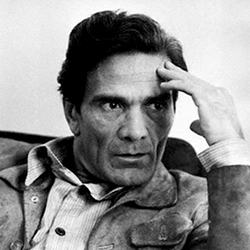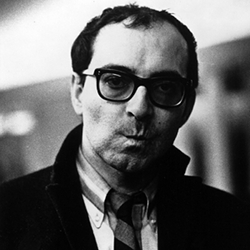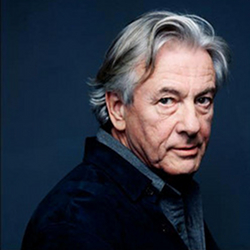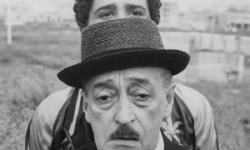
TIFF’s Objects of Desire - The Cinema of Claire Denis Review: Chocolat (1988) - NP Approved

Cast: Isaach De Bankolé, Giulia Boschi, François Cluzet
Director: Claire Denis
Country: France | West Germany | Cameroon
Genre: Drama
Editor’s Notes: The following review is part of our coverage for TIFF’s Objects of Desire: The Cinema of Claire Denis which runs from October 11th to November 10th at TIFF Bell Lightbox. For more information on upcoming TIFF film series visit http://tiff.net and follow TIFF on Twitter at @TIFF_NET.
A great film is like flowing prose: all the elements must coalesce in order to elicit an emotion or provoke an internal discussion among its audience. Film as art must move and internalize its objective within the viewer to make it worth the time the viewer gives to it. Claire Denis is an artist of the tableau vivant, the revealer of unspoken dialogue, and a filmmaker that infuses her stories with color.
Claire Denis is an artist of the tableau vivant, the revealer of unspoken dialogue, and a filmmaker that infuses her stories with color.
In her semi-autobiographical debut Chocolat, Denis presents us with the tale of a French woman named France Dalens (Mireille Perrier) who returns to her childhood home which used to be a colonial outpost in Cameroon. The film is told through a series of the woman’s strongest memories as a child (France as a child played by Cécile Ducasse), and her friendship with her family’s houseboy Protée (C’sar award winning Isaach De Bankolé). France as a child is isolated from her bored mother Aimée (Giulia Boschi) and her father Marc (Francois Cluzet) who is always away on government business. She spends most of her time with Protée who shares riddles and time with her when she is at her most troglodytic.

Born in Paris, Denis spent a great deal of her childhood in Africa. She was well attuned then to the sensitivities of racial politics. In part, the Ferdinand Oyono novel “Houseboy” (which is actually one of my favorite novels of all time), was a bit of an inspiration for this tale. While Chocolat gives us the vantage point of a little girl observing the intricacies of adult matters and racial tension, Houseboy is seen through the eyes of Toundi, a young Cameroonian houseboy who is curious about the world of white people. Both stories run along parallel grounds where the servant is necessary to the home’s function, but is equally made invisible by his role.
The title of Chocolat refers to a slang term “to be cheated.” Everyone in here is a beguiled soul. Aimée is the bourgeoise female that has no power over the males who reside in her household with the exception of her houseboy. Protée has no agency within the confines of the part that he plays as servant and the mutual sexual tension that threads his interactions with Aimée . Marc, although the head of a house and a government official, is still just a disenfranchised individual commanding a post that is completely out of his cultural element. France is merely a child with neither familiarity outside of her sheltered home nor the recognition of the very corporal conflicts that unceasingly surround her.
The tensions become palpable as the household is visited by a group of people from a plane that has made an emergency landing on their property. Among them is Luc (Jean-Claude Adelin), an ex-seminarian who tries to live among the servants. He astutely reveals the feelings between Protée and Aimée leading to the climatic moment that has Protée impress the greatest lesson upon the naive France.
However, the outsider must relent and stand aside as a witness its unforgiving beauty: this is the core to Denis’s devastating reveal.
Chocolat is a film saturated in the sunshine yellow contrasted with the darkness within its characters. The traditional African soundtrack by Abdullah Ibrahim is the only sound you hear besides that of nature and the house’s murmurings. The cinematic depth of frame stills that Denis creates within the moving story permeates with heat and segregation in its visuals; these are concepts before the viewer, but are also felt peripherally among its characters. When an older France accepts a ride from Mungo, the transplanted immigrant from America, she sits quietly in the back seat listening to Mungo relate the true remoteness of the outsider “hero/heroine” looking for answers in Africa. Cameroon has nothing to offer the tourist or the immigrant, but the role of desperate observer who wants to be a part of the exotic picture. However, the outsider must relent and stand aside as a witness its unforgiving beauty: this is the core to Denis’s devastating reveal. There is solitude in France’s search for identity: her answers are not to be found geographically, but within the pragmatic synergistic agitation of the people she once knew.
Denis is known for her disencumbered endings that contain universal meanings and blunt truths in its framing. In Chocolat, Claire Denis leaves you wondering how relatable human beings have created such a partitioned world out of unlimited harmonious possibility. There are lessons to be learned in its construct and Denis doesn’t spoon-feed them to you, rather she makes you experience them first hand.
Related Posts
![]()
Jacqueline Valencia
![]()
Latest posts by Jacqueline Valencia (see all)
-
supahfreak17
-
shajgonzalez



























